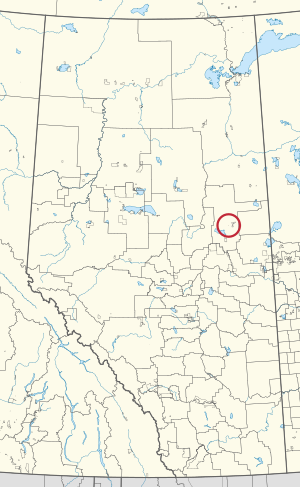Heart Lake 167A facts for kids
Quick facts for kids
Heart Lake 167A
|
|
|---|---|
| Heart Lake Indian Reserve No. 167A | |

Location in Alberta
|
|
| First Nation | Heart Lake |
| Treaty | 8 |
| Country | Canada |
| Province | Alberta |
| Specialized municipality | Lac La Biche |
| Area | |
| • Total | 8.3 ha (20.5 acre) |
Heart Lake 167A is a special area of land in Alberta, Canada. It is known as an Indian reserve and is home to the Heart Lake First Nation. This land is located within a larger area called Lac La Biche County.
Contents
What is Heart Lake 167A?
Heart Lake 167A is a small piece of land set aside for the Heart Lake First Nation. It is officially called an "Indian Reserve" in Canada. This land helps the First Nation keep their culture and traditions alive.
Location and Size
Heart Lake 167A is found in the province of Alberta, which is in western Canada. It's part of Lac La Biche County, a region known for its beautiful lakes and forests. The reserve is quite small, covering about 8.3 hectares. To give you an idea, a hectare is about the size of a soccer field.
The Heart Lake First Nation
The Heart Lake First Nation is a group of Indigenous people who have lived in this area for a very long time. They are part of the larger Cree nation, one of the largest groups of First Nations in Canada. Their traditional lands cover a wide area in Alberta.
Their History and Culture
The Heart Lake First Nation has a rich history and unique culture. They have strong connections to the land and its resources. Their traditions often include hunting, fishing, and trapping, which have been important for their survival and way of life for centuries. They also have special ceremonies and stories that are passed down through generations.
What is an Indian Reserve?
An Indian reserve is a piece of land in Canada that has been set aside by the government for the use and benefit of First Nations people. These lands are protected and managed by the First Nations themselves, often with support from the Canadian government.
- Purpose: Reserves were created to provide a place for First Nations communities to live, govern themselves, and maintain their cultural practices.
- Management: The First Nation's leaders, like a chief and council, make decisions about how the reserve is used and how the community is run.
- Importance: Reserves are very important for First Nations to preserve their heritage, languages, and unique ways of life.
Treaty 8 Explained
Heart Lake First Nation is a signatory to Treaty 8. A treaty is like a big agreement or contract between different groups of people. Treaty 8 was signed a long time ago, starting in 1899, between the Canadian government and several First Nations, including some Cree, Dene, and Chipewyan groups, in what is now northern Alberta, northeastern British Columbia, and northwestern Saskatchewan.
- What it means: For First Nations, treaties like Treaty 8 are sacred agreements that recognize their original rights to the land and resources.
- Promises: The treaty involved promises from the government, such as setting aside reserve lands, providing education, and supporting hunting and fishing rights.
- Ongoing Importance: Even today, Treaty 8 continues to be very important. It guides the relationship between the Heart Lake First Nation and the Canadian government.
 | Misty Copeland |
 | Raven Wilkinson |
 | Debra Austin |
 | Aesha Ash |

